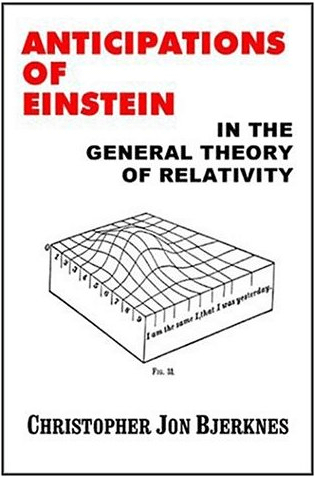Anticipations of Einstein in the General Theory of Relativity (Buy Now)
In 1997, amid much fanfare, Leo Corry announced to the world that he had uncovered proof that Albert Einstein arrived at the generally covariant field equations of gravitation, before David Hilbert. Leo Corry joined with Juergen Renn and John Stachel and published an article in the journal "Science" arguing against Hilbert's priority. Their claims were largely based on a set of printer's proofs of David Hilbert's 20 November 1915 Goettingen lecture, which Corry had uncovered. However, in this 1997 article, "Belated Decision in the Hilbert-Einstein Priority Dispute," Corry, Renn and Stachel failed to disclose the fact that these printer's proofs were mutilated, and are missing a critical part. Full disclosure of the facts reveals that even in their mutilated state, these proofs prove that Hilbert had a generally covariant theory of gravitation before Einstein, and that Einstein plagiarized these equations from Hilbert. The author of "Albert Einstein: The Incorrigible Plagiarist" focuses in on the general theory of relativity and discredits the baseless historical revisionism of Leo Corry, Juergen Renn and John Stachel. The direct comparison of primary source material demonstrates that Albert Einstein did not originate the theory of relativity. Formal mathematical proofs explain how Einstein was forced to fudge his equations in order to derive the results Paul Gerber and Johann Georg von Soldner had published long before him. Einstein did not yet have the benefit of plagiarizing David Hilbert's generally covariant field equations of gravitation and was operating under an erroneous assumption. An extensive history of the principle of equivalence proves that Einstein plagiarized this idea. The book reprints the relevant papers by Einstein, Soldner, Gerber, and Hilbert, as well as the remainder of David Hilbert's mutilated printer's proofs of his article "The Foundations of Physics". While the book presents the mathematical proofs needed to justify its claims, the non-mathematical reader will find it rich in prose and will be able to follow the arguments and the history presented.
From the Inside Flap
"In a sense, Einstein had 'appropriated' Hilbert's contribution to the gravitational field equations as a march of his own ideas--or so it would seem from the reading of his 1916 Ann. d. Phys. paper on the foundations of general relativity."--Prof. Jagdish Mehra
"[Hilbert] would soon [***] pinpoint flaws in Einstein's rather pedestrian way of dealing with the mathematics of his gravitation theory."--Dr. Tilman Sauer
". . .Gerber, who has given the correct formula for the perihelion motion of Mercury before I did."--Albert Einstein
"Remarkably, Einstein was not the first to discover the correct form of the law of warpage [***] Recognition for the first discovery must go to Hilbert."--Prof. Kip Thorne
"No unprejudiced person can deny that, in the absence of direct and incontrovertible proofs establishing his innocence, Einstein must, in view of the circumstantial evidence previously presented, stand convicted before the world as a plagiarist."--Prof. Arvid Reuterdahl
"Thus, with what is known as the special theory, if we consider as paramount factor not the detail work but the guiding thoughts by which this was inspired, then the father of this special relativity theory was undoubtedly Henri Poincare. [***] In the general theory of relativity the basic thought is that of Mach, viz. the replacement in dynamics of the law of gravitation by a law of motion. But in what Einstein built upon this basis the influence of Poincare is again manifest. [***] And in view of all these facts one does not know at which to be most astounded: the magnanimity of Poincare who was always over-anxious that there should be recognition of the labors of those who reaped where he himself had sown, the apathy of his friends after his death, or the peculiar attitude of Einstein and his coterie, exemplified by Born of Goettingen, who refers to Poincare as one of those who 'collaborated' with Einstein in the development of the relativity theory!"--Robert P. Richardson
"From these facts the conclusion seems inevitable that Einstein cannot be regarded as a scientist of real note. He is not an honest investigator."--Prof. O. E. Westin



